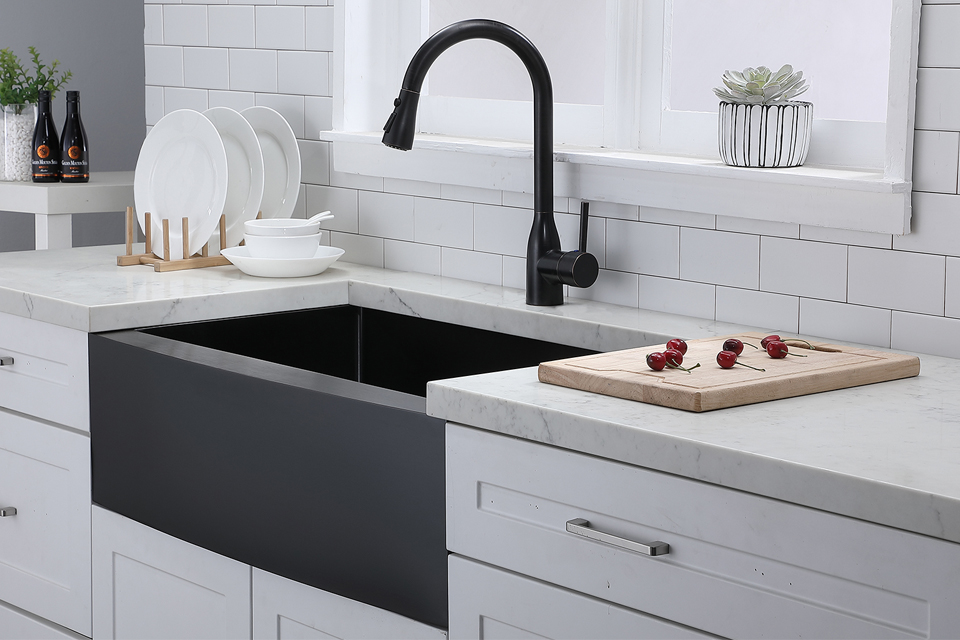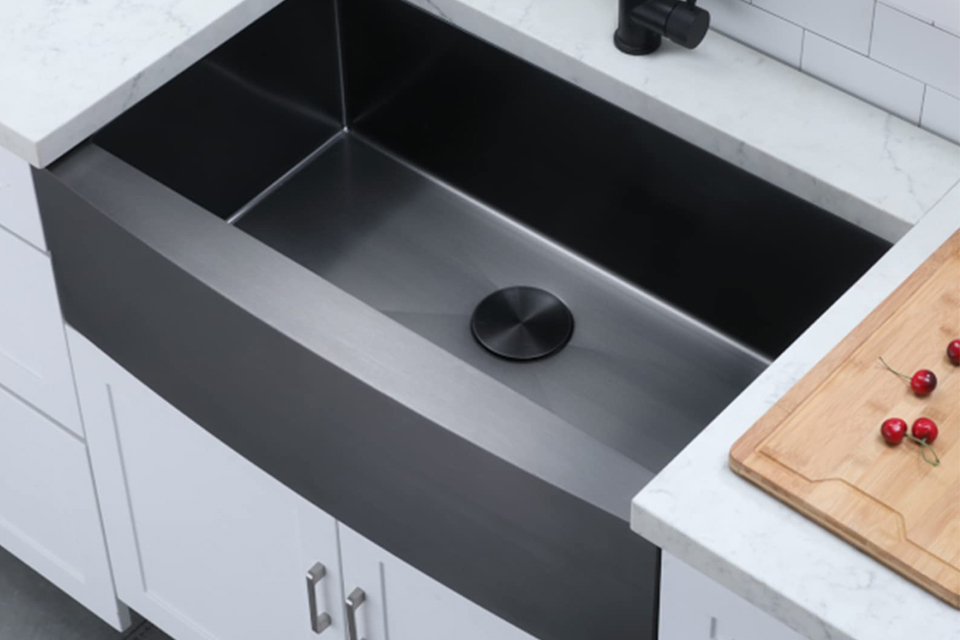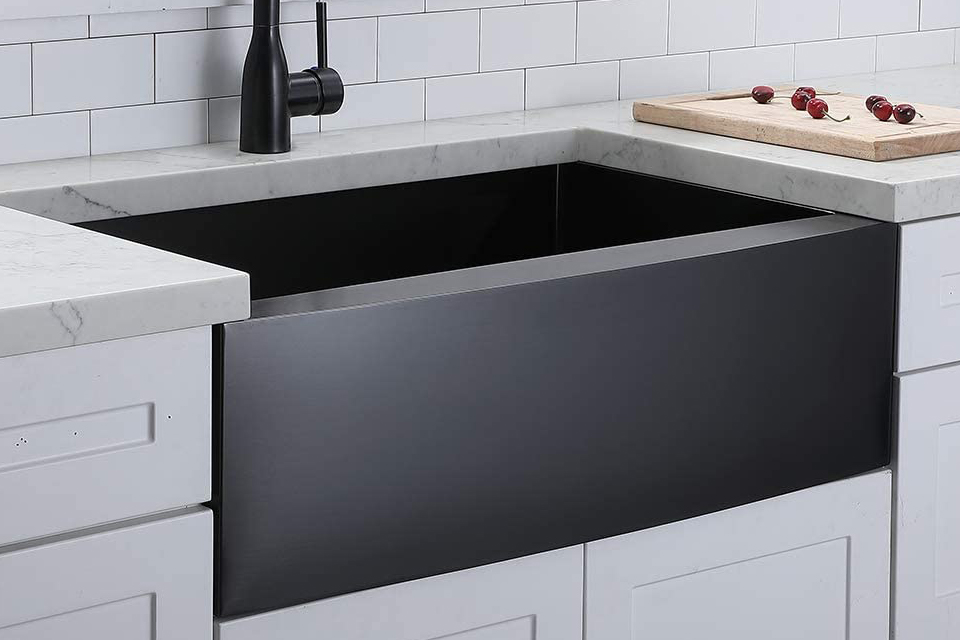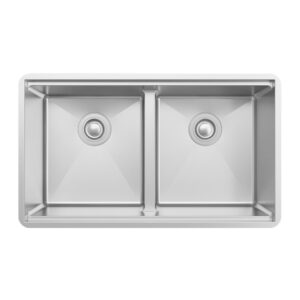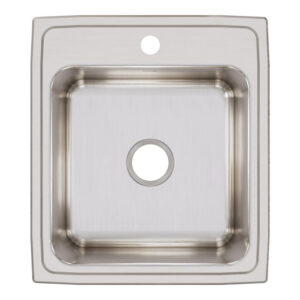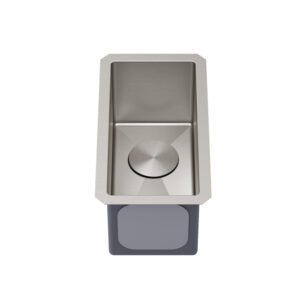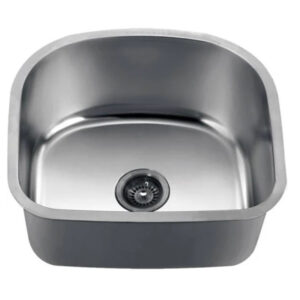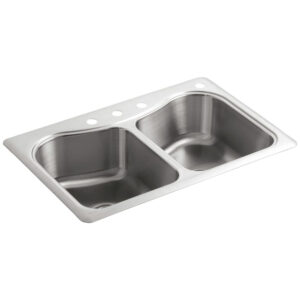
Is a Composite Granite Sink Better Than a Stainless Steel Sink
Table of Contents
Two of the most popular options are composite granite sinks and stainless steel sinks. In this article, we will compare these two types of sinks in detail, helping you understand their unique features, benefits, and drawbacks. By the end of this read, you’ll have the insights needed to choose the sink that best fits your kitchen needs.
What is a Composite Granite Sink?
Composite granite sinks are crafted from a combination of natural stone and acrylic resins. This blend results in a sink that mimics the appearance of natural stone, providing a luxurious and sophisticated look. These sinks are available in a variety of colors, including black, gray, and white, making them versatile enough to complement different kitchen styles.
Composite granite sinks are known for their durability. The material is resistant to scratches, chips, and heat, making it ideal for a busy kitchen environment. Moreover, these sinks are non-porous, which means they resist stains and bacteria, making them easy to clean and maintain.
Key Features of Composite Granite Sinks:
- Material: Made from a mix of natural stone and acrylic resin.
- Durability: Highly resistant to scratches, chips, and heat.
- Maintenance: Non-porous surface that resists stains and bacteria.
Understanding Stainless Steel Sinks
Stainless steel sinks have been a staple in kitchens for decades due to their affordability, durability, and sleek appearance. These sinks are made from a combination of steel and chromium, which gives them their characteristic shine and resistance to rust and corrosion.
One of the most significant advantages of stainless steel sinks is their versatility. They fit seamlessly into a wide range of kitchen designs, from modern to traditional. Stainless steel sinks are also lightweight and easy to install, making them a popular choice for both new constructions and kitchen remodels.
Key Features of Stainless Steel Sinks:
- Material: Made from steel alloy with chromium for rust resistance.
- Durability: Resistant to rust, corrosion, and high temperatures.
- Maintenance: Easy to clean, but may show water spots and scratches over time.
Composite Granite Sinks vs. Stainless Steel Sinks: Key Differences
When comparing composite granite sinks and stainless steel sinks, several key differences stand out. These differences can influence your decision based on your kitchen’s needs and your personal preferences.
Appearance and Aesthetics
Composite granite sinks offer a natural stone look that adds elegance to any kitchen. They come in a variety of colors, allowing you to choose a sink that matches your countertop and cabinetry. On the other hand, stainless steel sinks provide a sleek, modern look that complements contemporary kitchen designs. The reflective surface of stainless steel can make a kitchen appear more spacious and bright.
Durability and Longevity
Both composite granite and stainless steel sinks are durable, but in different ways. Composite granite is resistant to scratches and chips, making it ideal for a busy kitchen where heavy pots and pans are frequently used. However, it can be more prone to cracking under heavy impact. Stainless steel, while more prone to showing scratches and water spots, is virtually indestructible and can withstand heavy use without chipping or cracking.
Maintenance and Cleaning
Composite granite sinks are non-porous, meaning they resist stains and bacteria. They are easy to clean with mild soap and water, and their color remains consistent over time. Stainless steel sinks, while easy to clean, may require more frequent wiping to avoid water spots and fingerprints. They are also more likely to show scratches, although these can be minimized with proper care.
Durability: Which Sink Stands the Test of Time?
Durability is a crucial factor when choosing a kitchen sink. Composite granite sinks are extremely durable, with a high resistance to heat, scratches, and stains. They can withstand hot pots and pans without damage and are less likely to show wear over time. However, they can be prone to cracking if subjected to heavy impacts.
Stainless steel sinks are also highly durable, particularly in terms of impact resistance. They do not crack or chip, even when heavy items are dropped into them. Stainless steel sinks are also resistant to rust and corrosion, thanks to the chromium content in the steel alloy. However, they can show scratches and dents more readily than composite granite sinks.
Maintenance: Keeping Your Sink in Top Condition
Proper maintenance is key to extending the life of your kitchen sink. Composite granite sinks are relatively low-maintenance. Their non-porous surface resists stains, making them easy to clean with just mild soap and water. To maintain the sink’s finish, it’s advisable to avoid abrasive cleaners or harsh chemicals.
Stainless steel sinks are also easy to clean, but they require more frequent attention to keep them looking their best. Water spots and fingerprints are more visible on stainless steel, so regular wiping with a soft cloth is recommended. Additionally, using a gentle cleaner can help prevent scratches and maintain the sink’s shine.
Cost Comparison: Composite Granite vs. Stainless Steel Sinks
Cost is often a determining factor when choosing between composite granite and stainless steel sinks. Composite granite sinks tend to be more expensive due to the cost of materials and the manufacturing process. However, their durability and aesthetic appeal can make them a worthwhile investment, particularly in a high-end kitchen.
Stainless steel sinks are generally more affordable and offer excellent value for money. They are available in a wide range of prices, depending on the gauge (thickness) of the steel and the quality of the finish. Even at the lower end of the price spectrum, stainless steel sinks offer durability and functionality that make them a popular choice for budget-conscious homeowners.
Installation Considerations: What to Know Before You Buy
The installation process can vary depending on the type of sink you choose. Composite granite sinks are heavier than stainless steel sinks, so they may require additional support during installation. It’s important to ensure that your countertop can support the weight of the sink, especially if you’re installing an undermount model.
Stainless steel sinks are lighter and easier to install, making them a more convenient option for DIY projects or quick kitchen renovations. They can be installed as drop-in or undermount sinks, giving you flexibility in terms of design and installation.
Environmental Impact: Which Sink is More Eco-Friendly?
In today’s eco-conscious world, many homeowners are considering the environmental impact of their kitchen choices. Composite granite sinks are made from natural materials, and the manufacturing process can be energy-intensive. However, these sinks are long-lasting, reducing the need for replacements and minimizing waste over time.
Stainless steel sinks are 100% recyclable, making them an environmentally friendly option. They can be recycled at the end of their life, reducing their environmental footprint. Additionally, the production of stainless steel has become more sustainable in recent years, with many manufacturers using recycled materials in their sinks.
Noise Reduction: Which Sink is Quieter?
Noise can be a concern when using a kitchen sink, especially if you have an open-plan kitchen or sensitive hearing. Composite granite sinks are naturally quieter due to their dense material, which absorbs sound and reduces noise when washing dishes or running water.
Stainless steel sinks, particularly those with a thinner gauge, can be noisier. However, many modern stainless steel sinks come with sound-deadening pads or coatings that help reduce noise. If noise is a significant concern for you, it’s worth investing in a stainless steel sink with these added features.
Final Verdict: Is a Composite Granite Sink Better Than a Stainless Steel Sink?
Ultimately, the choice between a composite granite sink and a stainless steel sink depends on your specific needs and preferences. Composite granite sinks offer a luxurious, durable option that resists stains and heat, making them ideal for high-end kitchens. On the other hand, stainless steel sinks provide a versatile, affordable, and virtually indestructible option that fits a wide range of kitchen styles.
If you’re looking for a sink that offers a natural stone appearance with excellent durability, a composite granite sink may be the better choice. However, if you prefer a sleek, modern look with easy maintenance and cost-effectiveness, a stainless steel sink might be the ideal option for your kitchen.
This article provides a comprehensive comparison of composite granite and stainless steel sinks, allowing readers to make an informed decision based on their kitchen needs, style preferences, and budget considerations.
Comments
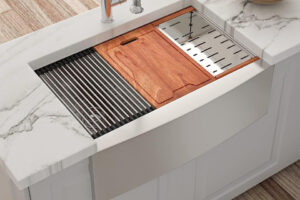
A Complete Guide: How to Install a Farmhouse Sink
Installing a farmhouse sink is a fantastic way to transform your kitchen with both style and functionality. These iconic sinks, also known as apron-front sinks, have become increasingly popular due to their deep basins and elegant design.
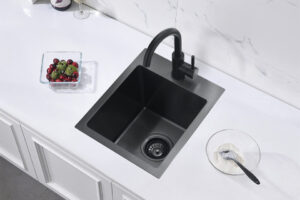
How to Unclog Your Kitchen Sink: The Ultimate Guide
Are you facing the frustrating problem of a clogged kitchen sink? Don’t worry, you’re not alone.
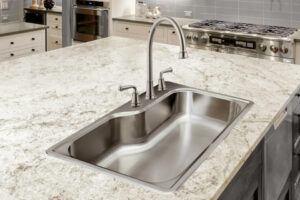
How to Clean Your Stainless Steel Sink Like a Pro
Keeping your stainless steel sink clean and sparkling not only enhances the overall look of your kitchen but also ensures long-term durability and hygiene.
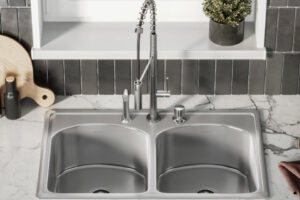
The Best Ways to How to Clean a Stainless Steel Sink
Keeping your stainless steel sink clean and shiny not only enhances the look of your kitchen but also prolongs the lifespan of your sink.
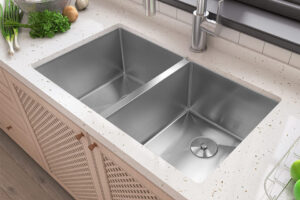
How to Seal Your Kitchen Sink to the Countertop: A Complete Guide
Sealing your kitchen sink to the countertop is a crucial step in ensuring a long-lasting, leak-free installation.
Tags
Related Blog
Learn the newest trends and common knowledge from our blog in stainless steel sinks business.
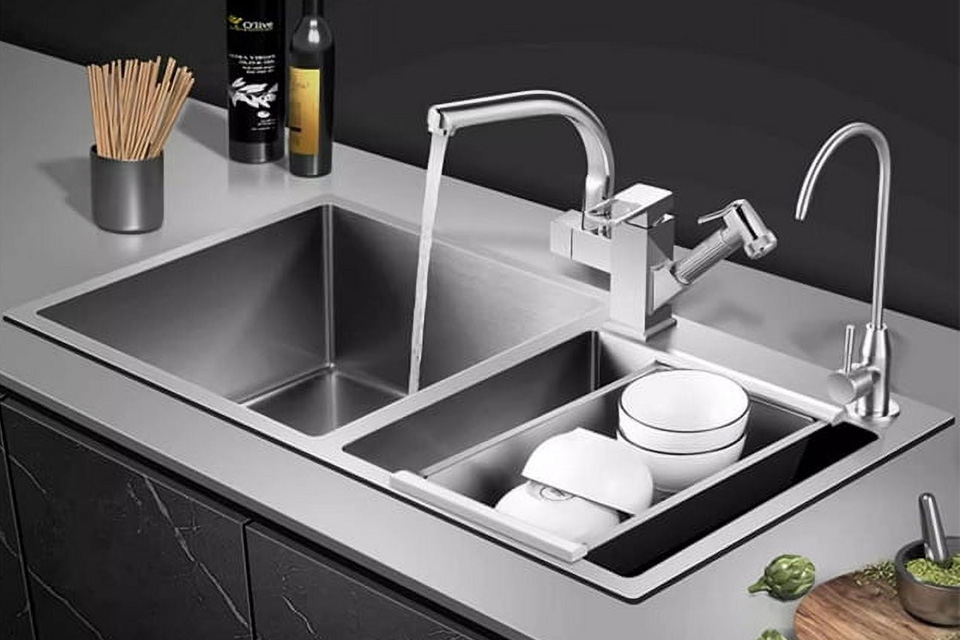
Which Stainless Steel Sink is Better: 18 Gauge or 20 Gauge
When deciding between an 18 gauge and a 20 gauge stainless steel sink, consumers face important considerations regarding thickness, durability, noise levels, and cost.
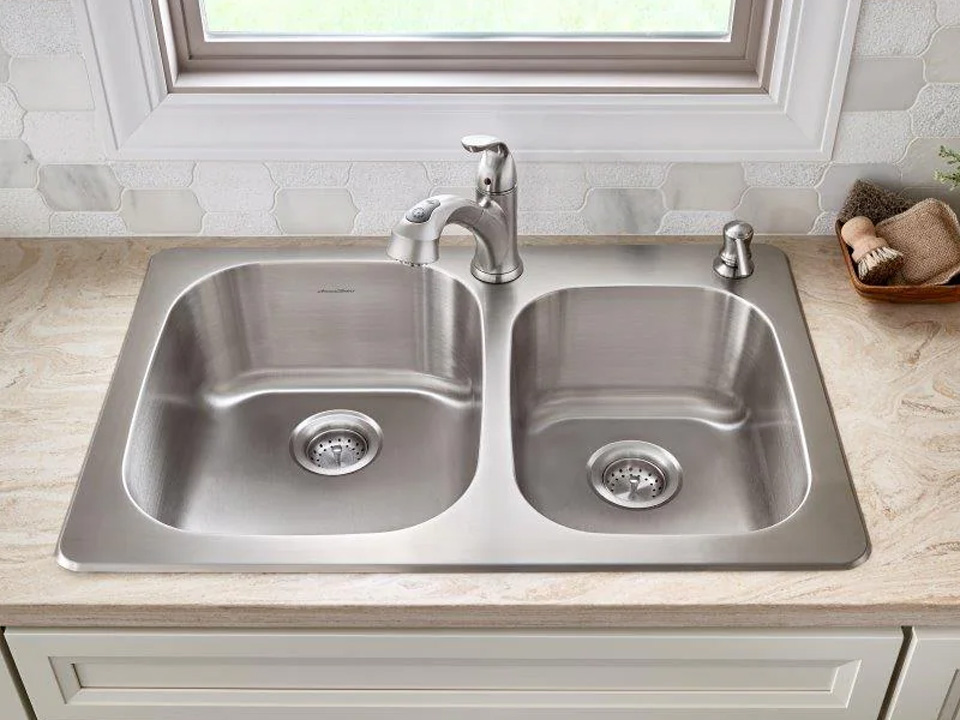
The Stainless Steel Kitchen Sink: A Modern Kitchen Essential
When planning a kitchen renovation or update, selecting the perfect sink is a crucial decision.
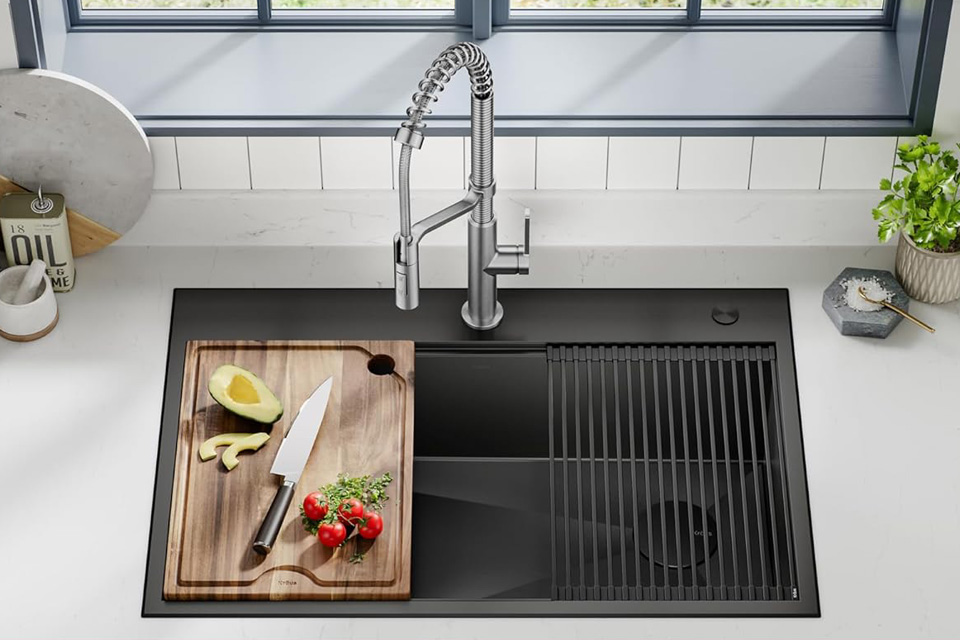
Is a Composite Granite Sink Better Than a Stainless Steel Sink
When remodeling or designing a kitchen, choosing the right sink is a crucial decision that impacts both functionality and aesthetics.

